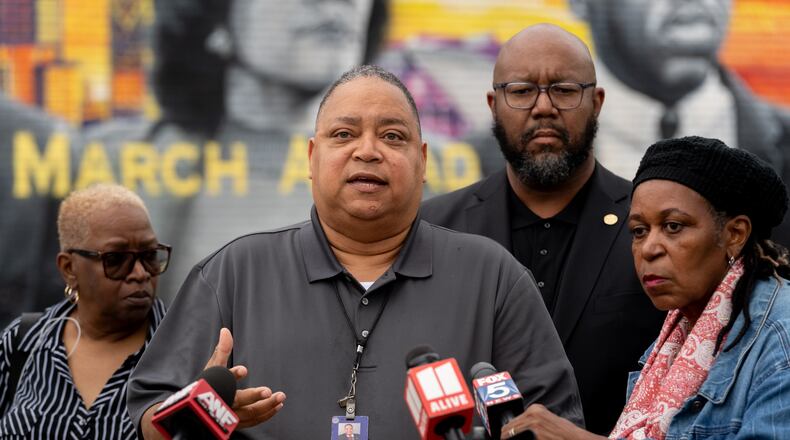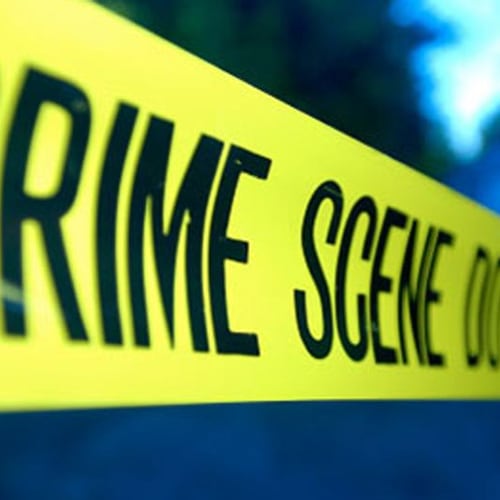Dozens were gathered at Rodney Cook Sr. Park on Easter Sunday, enjoying family picnics or taking a stroll with friends, when gunshots rang out from the basketball courts.
Authorities say a verbal dispute preceded the shooting, which resulted in injuries to a 3-year-old girl when her arm was grazed by a bullet. A video released by police shows crowds sprinting away from the scene in a desperate attempt to take cover.
Just this Sunday, not far from the park, one man was killed and another injured in a shooting on M.L.K. Drive.
Those were just two incidents in a series of shootings this month in the Vine City and English Avenue neighborhoods ― many of which were fatal. On Wednesday, Atlanta City Council members and neighborhood leaders gathered together to demand change.
“The list goes on and on,” Shadé Yvonne Jones, chair of NPU-L, said of the violence. “This is a daily problem.”
Jones and others said the gunfire has not waned despite past efforts by the Atlanta Police Department to increase the number of officers living in the troubled neighborhoods, including dozens of recruits who moved into an English Avenue Apartment complex in 2022.
And although Atlanta Mayor Andre Dickens touts a more than 20% reduction in homicides across the city last year, that decrease is not felt by many fearful residents. Jones described the neighborhoods on the westside of the city as “under siege and under attack.”
“The cry is for engagement, the cry is for public safety,” she said. “You cannot expect the community to stand up against guns when that is the job of the police officers. So we are crying out for support.”
Credit: Ben Hendren
Credit: Ben Hendren
Council members who represent the areas of the city under the shadow of Mercedes-Benz Stadium are also pressing the city’s public safety agencies to do more. Council member Michael Julian Bond said Wednesday they want more patrols of every kind.
“We need more activity from the Atlanta police in our community,” he said. “We want to see bicycle patrols, we want to see foot patrols. We want to see the officers who live in this community more than just when they’re coming and going from their home.”
The state preempts local changes to firearm laws, so there is not a lot Atlanta’s elected leaders can do, aside from pouring additional funds toward increased policing. Bond said residents, too, need to step up.
“We have a right to be here — violence doesn’t belong here,” he said. “We’re united as a community to say no more violence, no more guns. We’re not going to tolerate those who use weapons in our community.”
Officials have consistently named interpersonal disputes as a leading contributor to the city’s violent crime numbers, and increased focus on teaching conflict resolution particularly to young residents and in Atlanta’s bustling nightlife scene.
During an editorial board meeting with The Atlanta Journal-Constitution in February, Dickens said a team of “violence interrupters” in the mayor’s Office of Violence Reduction keep an ear out for brewing arguments that could lead to gunfire.
“They go in and they talk to people,” he said. “They talk them off of ledges that could really lead to negative consequences.”
Council member Byron Amos said that the police Zones 1 and 5 that encompass parts of the Vine City and English Avenue neighborhoods saw a reduction in crime last year. But he called on residents to help again “by simply putting down the guns.”
“Within a week’s time, we had three people killed,” he said. “I don’t think any of these incidents were strangers-on-strangers, but I will go on a limb and believe that all of it was preventable.”
“The streets of Heaven are too crowded with the angels of our residents,” Amos said. “We need your help.”
About the Author
Keep Reading
The Latest
Featured



